The Best Movies of 2020 (So Far) and Where to Watch Them

We have little to look forward to or feel good about anymore, which is why, rather than succumb to the despair of knowing that calling your franchise refresher Bad Boys for Life feels almost prescient at this point, we should celebrate that we have somehow been gifted a genuinely great Werner Herzog movie in this, the year of our lord 2020, the beginning of the Crisis Era.
So, in continuing to calculate the empirically best movies of the year so far, we’ve done our best to provide links to sites and services where you can watch our recommendations, all while, we hope, pitching in to keep your local theaters afloat in these wretched times.
Still, we left off a few films we think are worth tracking down whenever they’re available, films such as My First Film and IWOW: I Walk on Water that are getting a lot of attention this year but titles that we, despite our efforts, can’t confirm will be “available” in the U.S. in 2020. Accordingly, too, we’re only considering U.S. distribution.
Plus, we’ve got other lists to consume, tracking more favorite movies of 2020:
The 10 Best Documentaries of 2020 (So Far)
The 10 Best Horror Movies of 2020 (So Far)
Here are the 25 best movies of 2020 so far:
The Assistant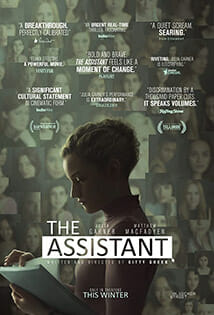 Release Date: January 31, 2020
Release Date: January 31, 2020
Director: Kitty Green
Stars: Julia Garner, Matthew Macfayden, Makenzie Leigh, Kristine Froseth
Genre: Drama, Thriller
Rating: R
Runtime: 87 minutes
The nameless, faceless boss hiding behind closed doors in Kitty Green’s exceptional The Assistant can be easily read as a Harvey Weinstein stand-in. The truth is that Harvey Weinstein isn’t or, now that he’s in prison, wasn’t the only man in the film industry with a habit of abusing his position and privilege by preying on women in his office, either through coercion or through brute force, he is, or was, the most notorious of them. So yes, The Assistant can be thought of as “the Harvey Weinstein movie,” but it really should be thought of as the best contemporary movie to act out patriarchal rape culture dynamics on screen.
Regardless, take Weinstein out of your interpretation of The Assistant and the film will still throttle you slowly, packing suffocating pressure into each of its 87 minutes. Green’s primary tool here is stillness: Static shots dominate the production, stifled frame after stifled frame, with the camera, manned by Michael Latham, often left hovering above Green’s star, Julia Garner, as if he means to leave space for her unanswered silent prayers to hang over her head. She plays the title’s long-suffering assistant, silent witness to her boss’s bullying and wanton lasciviousness, helpless to stop it. She spends the film unraveling over the course of a day, confronting her complicity in his sexual predation with no tangible hope of ending the cycle. Because there is no hope in The Assistant, no chance the film’s central evil will meet his punishment, or that the system built to facilitate his evil will collapse. What Green has done here is brutal and unsparing, but it’s also flawlessly made and necessary. —Andy Crump
Where to Watch: Available to watch on Hulu
Babyteeth Release Date: June 19, 2020
Release Date: June 19, 2020
Director: Shannon Murphy
Starring: Eliza Scanlen, Essie Davis, Ben Mendelsohn, Toby Wallace
Genre: Drama, Comedy
Rating: NR
Runtime: 117 minutes
If Josh Boone’s The Fault in Our Stars had several drug addictions, plus an overwhelming need for family therapy, it’d read like distant kin to Babyteeth, Australian filmmaker Shannon Murphy’s feature debut. Babyteeth files under the “sick teenager” romantic dramedy sub-genre, being the story of Milla Finlay (Eliza Scanlen), a high school student struggling through youth with cancer while living with her overmedicated basket case mom, Anna (Essie Davis), and her emotionally remote psychiatrist dad, Henry (Ben Mendelsohn). Add into that dynamic the arrival of Moses (Toby Wallace), who parts the Finlay’s woes with all the grace of a caroming meteor. Babyteeth orbits the danger baked into Milla’s infatuation with Moses, which of course blooms into genuine fancy between them. He’s chaos incarnate with a rat tail and a face tattoo, but he clearly digs her, so she digs him back. The feelings that each has for the other are so baldly recognizable that Anna and Henry reluctantly allow the courtship to progress. “This is the worst possible parenting I can imagine,” Anna opines, one of the many acerbic punchlines given to her by Rita Kalnejais’ screenplay, each delivered with wide-eyed, deadpanned resignation. The dueling complications and contradictions of Babyteeth’s narrative make up its greatest treasures, captured with the marriage of naturalism to dreamlike aesthetics. One easy way to interpret the movie’s airy atmosphere is as a mirror of the characters’ stupefaction, whether pharmaceutical or spiritual. By the end, as Scanlen’s performance gains exponential clarity and power, that breezy quality connotes gentle acceptance. It’s a reflection of how people gradually learn to let go. —Andy Crump
Where to Watch: Available to rent on most major streaming platforms
Bacurau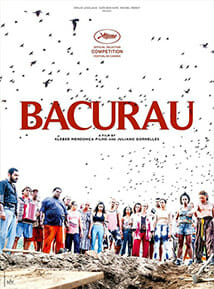 Release Date: March 6, 2020
Release Date: March 6, 2020
Directors: Kleber Mendonça Filho, Juliano Dornelles
Starring: Bárbara Colen, Thomas Aquino, Silvero Pereira, Sônia Braga
Genre: Drama, Science Fiction & Fantasy
Rating: NR
Runtime: 132 minutes
Brazilian directors Kleber Mendonça Filho and Juliano Dornelle’s Bacurau begins with a woman named Teresa (Bárbara Colen) being driven down a winding mountain road with sweeping swathes of lush greenery below. Suddenly, a splintered wooden casket appears in the middle of the asphalt. After the driver swerves to avoid it, there is another one. And another. Soon, broken caskets litter the entire road. The cause of the coffin calamity is revealed when Teresa sees that an open-back truck transporting caskets has collided into the mountainside, killing its passengers. The scene is oddly pleasant, though, as opportunists have quickly begun selling off the least damaged goods to a line of passersby, both seeming giddy about the exchange. Death is pervasive in the film, but it is often funny, and coincidentally Teresa is on her way to a funeral. Her grandmother—the beloved matriarch of Bacurau, a small Brazilian village where she grew up—has died. The entire town mourns her death, oblivious to the fact that their little village is slowly, literally, being erased from the face of the earth. Here, what has seemed like a horror film morphs into a weird Western that incorporates psychoactive flora, a seemingly benign history museum, and even an apparition or two. That’s not even counting the UFO. Bacurau is wildly creative, and its hilarious, Dadaist aura provides an uncanny comfort despite ample bloodshed. This is not to say that it’s without heart-wrenching loss and tearful contemplation of a world on fire. It’s clear that there is no space for moral ambiguity in this film. In reality, the Amazon is ablaze, rampant inequality festers and indigenous populations are displaced all for the net benefit of the ruling class. Bacurau is a long overdue neo-colonial revenge fantasy. —Natalia Keogan
Where to Watch: Available through Kino Lorber’s Virtual Screening Room, sharing proceeds with local, independent theaters across the country
Bad Education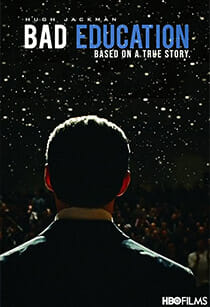 Release Date: April 25, 2020 (HBO)
Release Date: April 25, 2020 (HBO)
Director: Cory Finley
Starring: Hugh Jackman, Allison Janney, Geraldine Viswanathan, Alex Wolff, Rafael Casal, Annaleigh Ashford, Ray Romano
Genre: Drama, Comedy
Rating: NR
Runtime: 109 minutes
Inspired by the true story of what happened in the Roslyn, New York, school district in 2002, Bad Education tells the truth-is-stranger-than-fiction story of superintendent Frank Tassone (Hugh Jackman) and his business manager Pam Gluckin (Allison Janney). This dynamic duo was beloved by their students, staff and parents … until it was discovered that they had systematically bilked the school system for millions of dollars. Directed by Cory Finley and written by Mike Makowsky, who grew up in Roslyn amid the actual scandal, the movie seeks to be dark satire and skewering social commentary about money, politics and privilege. What are we as a society willing to ignore if looking the other way is in our best interests? But Bad Education is more about the dogged determination of one high school student who uncovered what a self-serving school board and an unquestioning, complaint auditor could not. Rachel Kellog (Geraldine Viswanathan) grows suspicious that the school can spend millions on a flashy skywalk to connect the high school buildings when so many of the existing buildings desperately need repair. As expected, Jackman and Janney are terrific. Both actors have the innate ability to truly disappear into the character they are playing. But Viswanathan is the true revelation here. Her wide-eyed performance as Rachel follows the money and uncovers the truth is the thrust of the story and Viswanathan captures that mix of being sure of what you are doing even though you know it’s going to make your life harder. Exactly why it took a high school student to finally uncover years of deception right beneath the surface is a lesson with even more resonance right now. In too many instances, journalists have stopped asking the hard questions. —Amy Amatangelo
Where to Watch: Available on HBO Max
Bloody Nose, Empty Pockets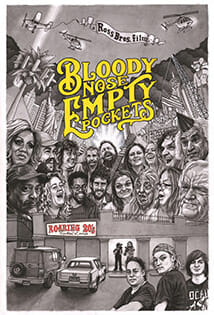 Release Date: January 24, 2020 (Sundance)
Release Date: January 24, 2020 (Sundance)
Directors: Turner Ross, Bill Ross IV
Genre: Documentary
Rating: NR
Runtime: 98 minutes
Songs of the soul flow from the drunken mouths of the jukebox-loving inebriates in Bloody Nose, Empty Pockets. The Ross brothers have created a prototype barroom experience: It is closing night for the fictionalized Roaring 20’s in Las Vegas, a real bar actually operating in their home base of New Orleans, and the regulars, led by local professional actor Michael Martin and otherwise populated with true bar-frequenting non-actors, have come together to kiss their favorite watering hole goodbye. Its much-discussed fictional framework is merely that—a framework—beneath which legitimate human interactions play out, with characters representing themselves and actually drinking the night away. There is authentic war vet commiseration and romantic longing, bartender-led singalongs and, inevitably, one guy trying to fight another “with eyes tattooed on his eyelids.” The holy trinity of dive bar life—despondency, frivolity and pugnacity—is present and spiritually enriching.
As always, the Ross bros depict those before their camera with the deepest care and respect. Pangs of regret and anguish sound between moments of hilarious drunken crosstalk, with Martin’s character pulling in close his younger, rambunctious four-eyed friend and imploring him not to likewise spend his life in a bar. The film runs the gamut of drunken night emotions, from wistful dancing to maudlin bouts of self-loathing, but the mood is never pinned to any specific emotion; it is less about one peak or one valley than it is about creating the shape of a waveform in itself. Yet each crest and trough is tinged with the fleeting feeling of the other: To be low is to be touched by the immense depth of drunken feelings, and to be high is to ride forth in embarrassing obliviousness. But somehow the images never whiff exploitation; they radiate a sense of humanity and an understanding of these American outcasts, who will surely flit from one closing bar to the next. What awaits them thereafter is a mystery, and perhaps a sad story we do not need to know. —Daniel Christian
Where to Watch: Now available through Altavod virtual cinemas, sharing proceeds with local, independent theaters across the country
Da 5 Bloods Release Date: June 12, 2020 (Netflix)
Release Date: June 12, 2020 (Netflix)
Director: Spike Lee
Starring: Clarke Peters, Delroy Lindo, Norman Lewis, Isiah Whitlock Jr., Chadwick Boseman, Jonathan Majors, Mélanie Thierry, Paul Walter Hauser, Jasper Pääkkönen, Jean Reno, Lê Y Lan, Johnny Trí Nguy?n
Genre: Action & Adventure, Drama, War
Rating: R
Runtime: 156 minutes
The hunt for buried gold neither ends well nor goes off without a hitch. The long road to reconciliation, whether with one’s trauma, family or national identity, is never without bumps. Glue these truths together with the weathering effects of institutional racism, add myriad references to history—American history, music history, film history—and you get Spike Lee’s Da 5 Bloods, a classically styled Vietnam action picture made in his cinematic vision. As in 2018’s BlacKkKlansman, Lee connects the dots between past and present, linking the struggle for civil rights couched in conscientious objection and protest to contemporary America’s own struggle against state-sanctioned fascism. After opening with a montage of events comprising and figures speaking out against the Vietnam War, referred to predominantly as the American War throughout the rest of the movie, Lee introduces four of the five bloods: Otis (Clarke Peters), Paul (Delroy Lindo), Eddie (Norm Lewis) and Melvin (Isiah Whitlock Jr.), bonded Vietnam vets returned to Ho Chi Minh City ostensibly to find and recover the bones of their fallen squad leader, Norman (Chadwick Boseman). There’s more, of course, “more” being around $17 million in gold bars planted in Vietnamese soil, property of the CIA but reappropriated by the Bloods as reparations for their personal suffering as men fighting a war for a country governed by people who don’t care about their rights. Lee’s at the height of his powers when bluntly making the case that for as much time as has passed since the Vietnam War’s conclusion, America’s still stubbornly waging the same wars on its own people and, for that matter, the rest of the world. And Lee is still angry at and discontent with the status quo, being the continued oppression of Black Americans through police brutality, voter suppression and medical neglect. In this context, Da 5 Bloods’ breadth is almost necessary. As Paul would say: Right on. —Andy Crump
Where to Watch: Available on Netflix
Driveways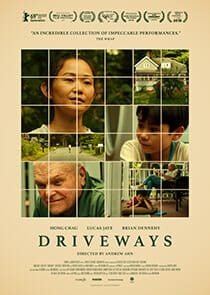 Release Date: May 7, 2020
Release Date: May 7, 2020
Director: Andrew Ahn
Starring: Hong Chau, Brian Dennehy, Lucas Jaye, Christine Ebersole, Jeter Rivera, Sophia DiStefano, Robyn Payne, Jerry Adler
Genre: Drama
Rating: NR
Runtime: 83 minutes
Loneliness looks different for the lonely depending on their circumstances, and Andrew Ahn’s sophomore feature, Driveways, captures that spectrum through character. For single mom Kathy (Hong Chau), loneliness means sitting amongst the clutter of her dead sister’s house, dwarfed by junk crammed into every corner and piled to the ceiling. For widower Del (Brian Dennehy), loneliness is literal: He lives alone in the house he shared with his wife for decades before her death, their only daughter having relocated to Seattle years prior. For Kathy’s son Cody (Lucas Jaye), loneliness is a weird blessing: Social anxiety makes him hurl; he’s happier reading or playing video games. Still, Cody wants to play with other kids, or at least he wants to want to, and Kathy, being a concerned mom, knows that even pleasant self-imposed isolation has adverse effects on children. Fortunately for both of them, Del is eager for company, though, as a man of a certain disposition, he’s not exactly the type to appear eager. Regardless, while Kathy cleans out her sister’s place, Del and Cody slowly bond, though their chummy and charming friendship has an expiration date: Kathy and Cody are out of towners staying in the unnamed New York hamlet where Del dwells only for as long as it takes to get the house settled and up for sale. As their time is short, so too is Driveways, a brisk, breezy 80 minutes where conflict is minimal and compassion prevails. Driveways is a simple picture about simple acts of human kindness; Ahn shot Driveways several years ago, and he premiered the film a hundred years ago at the Berlin International Film Festival in 2019, so neither he nor writers Hannah Bos nor Paul Thureen mean to make any comment on what gets airplay on the daily news, but American antipathy is a real thing and Driveways is the accidental salve the rest of us need for our current era of callous stupidity. —Andy Crump
Where to Watch: Available to rent or buy on most major streaming services
Ema Release Date: January 24, 2020 (Sundance)
Release Date: January 24, 2020 (Sundance)
Director: Pablo Larraín
Starring: Mariana de Girolamo, Gael García Bernal, Santiago Cabrera, Paola Giannini, Catalina Saavedra
Genre: Drama
Rating: NR
Runtime: 113 minutes
Like the opening segment of Gaspar Noé’s Climax adulterated with slo-mo, luxuriously engulfed anarchy of Bertrand Bonello’s Nocturama, Pablo Larraín’s Ema begins with catharsis then treads through imagistic urban landscapes to figure out what the consequences of all that bloodletting will be. When we meet Ema (Mariana de Girolamo), she is kinetic: She leads both her husband Gaston’s (Gael Garcia Bernal) modern dance troupe—though her impulse toward reggaeton, all lasciviousness and relentlessness, conflicts with his more traditional roots—and she sneaks into the night, festooned by flame thrower, to burn down street lights and cars and the other such accessories of ordered, civilized society. Gaston’s new piece and Ema’s incendiary nights are driven by grief, mostly—the couple is haunted by their choice to give their foster son, Polo, back to the State after he set Ema’s sister’s face on fire, horribly scarring her. The heavy-handed symbolism refuses to let up from there: As Ema draws further away from Gaston, embracing reggaeton with her like-minded fellow dancers and causing a small coup in Gaston’s crew, she leans into the sexual liberation reggaeton represents, developing multiple physical relationships born from how, more and more, Ema seems to truly get the appeal and power of her body—an instrument and weapon she wields so well. A plan gradually reveals itself; Ema manipulates the desires of everyone in her orbit until she’s carved out a new definition of “family” for herself—and herself only—burning down everything else in her path. Which may be something of a point for the Spanish director, that real freedom will never exist in our current notions of “home” and “marriage” and “son” (Larraín more than once alludes to inappropriately intimate, physical bonds Ema allowed with her adopted boy, to Gaston’s horror) and that only borderline-sociopaths like Ema will ever push us beyond our hang-ups, but he hardly seems to care himself. Instead, he’s enchanted by the images of Ema’s visceral imagination, by the intense dreams pulled from her roiling subconscious passions and set sputtering and shining into life. —Dom Sinacola
Where to Watch: Was available on MUBI in the U.S. for a short time; Music Box Films owns distribution in the U.S. and was originally planning a small theatrical release, which was canceled due to the pandemic, but one can’t imagine they won’t soon release the film digitally in some capacity
Emma. Release Date: March 6, 2020
Release Date: March 6, 2020
Director: Autumn de Wilde
Starring: Anya Taylor-Joy, Johnny Flynn, Bill Nighy, Mia Goth, Josh O’Connor, Callum Turner, Miranda Hart
Genre: Comedy, Romance
Rating: PG
Runtime: 132 minutes
Shot as though each frame were a frothy realist painting, scored as though it were a Chaplin-esque silent film and pulled together by a cast of comedically impeccable performances, Autumn de Wilde’s feature-length debut, Emma., is made up almost entirely of thrillingly executed moments. More comedy of manners than straight romance, both Jane Austen’s novel and de Wilde’s film take as their subject a happily single Emma Woodhouse (Anya Taylor-Joy), the “handsome, clever, and rich” mistress of an English country estate, as she fills her days as by mounting a series of ego-driven (if well-intentioned) matchmaking schemes. Signaled by the film’s opening in the soft dawn hours of the village’s latest Emma-orchestrated wedding day, these schemes have a history of being remarkably successful—successful enough, at least, that on one side, Emma has her co-dependent, doom-and-gloom father (a charming, if anxious, Bill Nighy) cautioning her not to start any schemes that might take her away from him, while on the other, she has the Woodhouses’ handsome family friend, Mr. Knightley (a refreshingly fiery Johnny Flynn), cautioning her against riding so high on her previous matchmaking coups that she starts an audacious scheme even she can’t pull it off. Beyond creating what would be a solid moviegoing experience in any context, the warm, boisterous sense of community this deep attention to detail works to build is, as Paste’s Andy Crump highlights in his thoughtful interview with de Wilde and Taylor-Joy, exactly what any 2020 take on a 205-year-old comedy of manners needed to cultivate. With our current cultural moment so defined by protracted digital isolation—and its cousin, anonymity-enabled cruelty—the best thing de Wilde’s Emma. could do was lean so hard into the sublimity of Austen’s original that, for the entirety of its gloriously phone-free two-hour runtime, its audience might feel, collectively, transported. —Alexis Gunderson
Where to Watch: Available to buy or rent on most major streaming platforms
Family Romance, LLC Release Date: May 18, 2019 (Cannes Film Festival)
Release Date: May 18, 2019 (Cannes Film Festival)
Director: Werner Herzog
Starring: Yuichi Ishii, Mahiro, Miki Fujimaki
Genre: Drama
Rating: NR
Runtime: 89 minutes
Shooting narrative fiction like he would anything else he makes hardly does Werner Herzog any favors—the worst of this recent output being Salt and Fire, wherein Gael Garcia Bernal has diarrhea so bad he leaves the movie entirely. Which is meant to be a joke, but given Herzog’s inability to convey contrived scenarios in any way but a-narratively, circumstance and shades of verite style making his every movie seem like some sort of experimental documentary, it doesn’t read like a joke. It’s a weird, uncomfortable extension of a context we as an audience aren’t partial to. We’re concerned more than amused, repulsed more than compelled. Did he really have diarrhea? We’re not sure what’s going on.
In Family Romance, LLC, filmed two years ago in Tokyo with non-professional actors, Herzog toys with the jarring nature of his docu-drama exigencies, able to plumb the depths of his self-awareness—perhaps his most lovable attribute as a filmmaker—in ways more heartbreaking and humanistic than anything he’s made in over a decade. Following small business owner Yuichi Ishii (playing himself) as he spends a day in the park with his estranged daughter (Mahiro), then meets with Mahiro’s mother (Miki Fujimaki), then accepts payment for services rendered pretending quite successfully to be Mahiro’s dad, then attends a meeting with a new client, who asks that one of Yuichi’s employees take the place of her sick husband during their daughter’s wedding, we move through the strangeness of this apparently real business, Family Romance, LLC, which rents out actors to play family members. How could anyone do this to their loved one? How could these actors keep from growing closer to the people they’re pretending to love? How come no one figures this out? Is this really a thing? Herzog provides lilting space for us to question the lovely artificiality of Yuichi’s encounters with faux family members—samurai LARPing and robot hotels and proper hedgehog maintenance find moments for reverie—then climbs nimbly out of the uncanny valley. Everyone knows the actor isn’t the bride’s real dad; her real dad is a drunk who will embarrass her on her wedding day, guaranteed, and all she really needs is a supportive father figure by her side. Despite the contrivance surrounding it, real or concocted, it’s a moment that rings achingly correct—a moment of quiet sublimity in our noisy world, found in a time when the world seems tapped out. Like all of Herzog’s best films, Family Romance, LLC reveals itself slowly, its greatness stumbled upon like a half-remembered dream of fake samurais committing fake seppuku, but filled with very real regret. —Dom Sinacola
Where to Watch: Available on Mubi
First Cow Release Date: March 6, 2020
Release Date: March 6, 2020
Director: Kelly Reichardt
Starring: John Magaro, Orion Lee, Rene Auberjonois, Toby Jones, Ewen Bremner
Genre: Drama
Rating: NR
Runtime: 121 minutes
Kelly Reichardt’s Oregonian ode to the human desire for comfort and friendship takes us back to the territory during the mid-19th century, when the economy of beaver pelts and gold rush hopefuls brought waves of migration to the area. A baker from Maryland, Otis “Cookie” Figowitz (John Magaro), finds himself amid a hostile group of fur trappers on the way to Oregon when he runs into King Lu (Orion Lee), a Chinese immigrant fresh on the run from scorned Russians. A fraternal bond between the two quickly materializes, and when a coveted dairy cow is brought to the territory by an English nobleman known as Chief Factor (Toby Jones), King Lu immediately recognizes that fresh milk combined with Cookie’s baking expertise could give the duo a unique trade in an area where the predominant sweet is a bland concoction of water and flour crackers. And so, in the dead of night, King Lu and Cookie leave the small shack they share with a metal pail in hand, sneaking through the pasture until they reach the dairy cow. Reichardt makes no moral judgement on them for stealing; the irony is that Cookie and King Lu’s act of theft is so small compared to the pillaging and exploitation that propelled America into an economic superpower in the first place. First Cow takes place when slavery was the main economic drive of the country, when Native Americans were facing genocide, when women were second-class citizens. First Cow will win most viewers over; it is funny in the most earnest way, with the beauty of friendship presented as the foundation of the film. Yet if the film wants to implore us to understand the essence of our species, its portrayal of burgeoning American capitalism is undoubtedly, jarringly, at odds with the nature of mankind. —Natalia Keogan
Where to Watch: Available to rent or buy on most major streaming platforms
Fourteen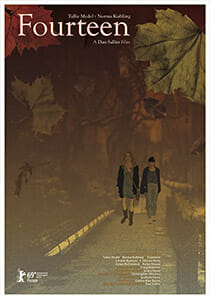 Release Date: May 15, 2020
Release Date: May 15, 2020
Director: Dan Sallitt
Starring: Norma Kuhling, Tallie Medel
Genre: Drama
Rating: NR
Runtime: 94 minutes
Fourteen explores lives in transit. Dan Sallitt’s minimalist epic takes up the slowly unspooling friendship between Mara (Tallie Medel) and Jo (Norma Kuhling), two twenty-somethings in New York City building careers in education and social work, respectively. It presents a vivid portrayal of the minutiae of a friendship, especially its rhythms. Sallitt’s editing style cuts together moments from their lives in a gamified way, with the viewer having to discern how much time has passed between one scene and the next, the time jump made discernible by a character’s new job or boyfriend. As a viewer, the feeling is that we’re brought into each scene in medias res. But this jumpy, fragmented way of editing adds to the film’s brand of realism. It helps that the film was shot gradually over several years—Sallitt’s previous film was 2012’s The Unspeakable Act, which also starred Medel—so changes in the characters’ appearances reflect the actors’ movements in time. Each scene is pared to the essentials, capturing Mara and Jo at a particular moment, allowing the viewer to observe subtle differences in each character’s behavior, from an annoyed tone on the phone or a missed dinner. With each passing scene, there’s a sense that Mara and Jo’s relationship is also the fantasy of an indissoluble friendship, tied together by aspirations to see the other in a way that no one else ever could, or the false promise that their once easy, breezy bond could stay the same as time goes on. The unsentimental drama aspires to evoke a slice-of-life naturalism, and mostly succeeds, illustrating the slow strain of a one-time best friendship that becomes just too difficult. —Isabella Bridie DeLeo
Where to Watch: Available through Grasshopper Films’ virtual cinema, sharing proceeds with local, independent theaters across the country
Heimat Is a Space in Time Release Date: September 2019 (TIFF)
Release Date: September 2019 (TIFF)
Director: Thomas Heise
Rating: NR
Runtime: 218 minutes
Sites of acknowledged historical significance—battlefields, museums or specific locations of importance—hardly seem to exist in the present tense; they live as cordoned-off spaces of reflection and contemplation, where a peaceful Now blankets a turbulent Then. Visitors who pass through know that the history that has happened in this space is so consequential it has caused time to stop, that nothing else can happen atop what has already taken place. The present cannot look forward. It must look back.
Thomas Heise’s Heimat Is a Space in Time, a three-and-a-half-hour first-person opus tracing his family’s march through the troubled course of 20th century German and Austrian history, takes on the very sort of sensation described above, itself an isolated space for reflection on the past and an individual’s power in a flawed society. Heise presents passions and tribulations of yesteryear matter-of-factly, as if they are evidence of a deterministic perspective suggesting, with ample evidence, that our lives and our choices are dictated by the systems that organize our societies. When Heise reads a correspondence between his mother, Rosemarie, and one of her first lovers, Udo—the couple separated by the East/West Berlin split—he presents their discussions dryly, as if he did not know either party. Heise emphasizes how these bureaucratic limitations exist ideologically and spatially, quite literally shaping the opportunities available to us: The world imposes rules at the whims of those in power, and suddenly people who were together are apart even while living in the same city. This is a history specific to Berlin, but Heimat also views this trajectory as universal, just another rise and fall and rise of governments and systems. Yet the personal stories of Heise’s family, who remained in East Germany under the German Democratic Republic, inform this entire perspective, and its toll on the individual is never far from sight. The film, then, works as its own cordoned-off historical site: a plane of reflection on a past composed of stories specific and broad. In Heimat Is a Space in Time, the imprint of the past is so dense and enduring that its spectral qualities drift beyond the battlefields, beyond the monuments, barracks and documents, to dissolve into daily life. —Daniel Christian
Where to watch: Now available for home viewing on Vimeo ($9.99 for a three-day rental), courtesy of Icarus Films and presented in partnership with Anthology Film Archives
The Invisible Man Release: February 28, 2020
Release: February 28, 2020
Director: Leigh Whannell
Starring: Elisabeth Moss, Oliver Jackson-Cohen, Harriet Dyer, Aldis Hodge, Storm Reid, Michael Dorman
Genre: Horror, Mystery & Suspense, Science Fiction & Fantasy
Rating: R
Runtime: 110 minutes
Aided by elemental forces, her exquisitely wealthy boyfriend’s Silicon Valley house blanketed by the deafening crash of ocean waves, Cecilia (Elisabeth Moss) softly pads her way out of bed, through the high-tech laboratory, escaping over the wall of his compound and into the car of her sister (Harriet Dyer). We wonder: Why would she run like this if she weren’t abused? Why would she have a secret compartment in their closet where she can stow an away bag? Then Cecilia’s boyfriend appears next to the car and punches in its window. His name is Adrian Griffin (Oliver Jackson-Cohen), and according to Cecilia, Adrian made a fortune as a leading figure in “optics” (OPTICS!) meeting the self-described “suburban girl” at a party a few years before. Never one to be subtle with his themes, Leigh Whannell has his villain be a genius in the technology of “seeing,” in how we see, to update James Whale’s 1933 Universal Monster film—and H.G. Wells’ story—to embrace digital technology as our primary mode of modern sight. Surveillance cameras limn every inch of Adrian’s home; later he’ll use a simple email to ruin Cecilia’s relationship with her sister. He has the money and resources to peer into any corner of Cecilia’s life. His gaze is unbroken. Cecilia knows that Adrian will always find her, and The Invisible Man is rife with the abject terror of such vulnerability. Whannell and cinematographer Stefan Duscio have a knack for letting their frames linger with space, drawing our attention to where we, and Cecilia, know an unseen danger lurks. Of course, we’re always betrayed: Corners of rooms and silhouette-less doorways aren’t empty, aren’t negative, but pregnant with assumption—until they aren’t, the invisible man never precisely where we expect him to be. We begin to doubt ourselves; we’re punished by tension, and we feel like we deserve it. It’s all pretty marvelous stuff, as much a well-oiled genre machine as it is yet another showcase for Elisabeth Moss’s herculean prowess. —Dom Sinacola
Where to Watch: Available to rent or buy on most major streaming platforms
Never Rarely Sometimes Always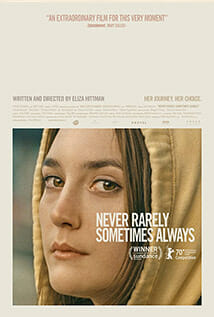 Release Date: March 13, 2020
Release Date: March 13, 2020
Director: Eliza Hittman
Starring: Sidney Flanigan, Talia Ryder, Sharon Van Etten, Ryan Eggold
Genre: Drama
Rating: NR
Runtime: 95 minutes
I keep thinking about the suitcase: Skylar (Talia Ryder) packs sweaters and a pair of jeans into an oversized travel bag (oversized, at least, for what is supposed to be a day-long trip). The next morning, Skylar and her cousin Autumn (Sidney Flanigan) board a bus from their hometown in rural Pennsylvania to New York City. When they get to Manhattan, the cousins take turns carrying the large bag, guarding it, rolling it on the sidewalk, lugging it up and down steep subway stairs. The pair has carefully planned a trip to New York so that Autumn can get an abortion without her mom (Sharon Van Etten) and stepdad (Ryan Eggold) knowing, since Pennsylvania requires parental consent for the procedure. The bag is the burden they carry; Never Rarely Sometimes Always—in emotive close ups, creating intimacy as if the viewer gets a chance to see the world through Autumn’s often solemn, stoic gaze—chronicles Autumn’s tortuous and convoluted path just to take agency over her body, studying the patience and perseverance that women often need to navigate the world. It’s a film punctuated by waiting, for one appointment or the other, or for the promise of safety. There are, however, brief moments that remind audiences that Autumn and Skylar are just kids—playing arcade games, or enjoying the thrill of an unfamiliar city—and these scenes, provide, at least, glimmers of respite or perhaps windows into what life could be if like if they didn’t have to work so hard for bodily autonomy. —Isabella Bridie DeLeo
Where to Watch: Available to rent or buy on most major streaming platforms
The Other Lamb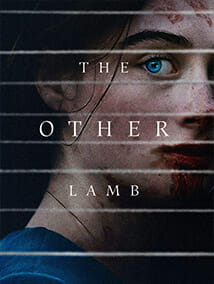 Release Date: April 3, 2020
Release Date: April 3, 2020
Director: Malgorzata Szumowska
Starring: Michiel Huisman, Raffey Cassidy, Denise Gough
Genre: Drama
Rating: NR
Runtime: 94 minutes
The so-called “Shepherd” sends Selah (Raffey Cassidy) to the hills to deliver a newborn lamb. Instead, she returns with blood-stained hands and the wrath of an almost anthropomorphic ram, who—for the rest of The Other Lamb—follows her around, breathing heavily, angry horns in her face and stony eyes challenging hers. The horror of The Other Lamb accrues slowly. Director Malgorzata Szumowska is a master of world building; the film is told through cult member Selah’s perspective, with the cult leader, the “Shepherd” (Michiel Huisman), existing as a more-or-less silent and cruel specter. Initially, the followers believe that only the male leader has the right to tell stories, but The Other Lamb skewers the male gaze. In the film, to see is to know—and to surveil. The leader organizes his all-women cult into two horrifying categories: Those who wear red frocks are forced to be his “wives” and the ones wearing blue are his “daughters,” many of whom, if not all, are his biological daughters (Szumowska obscures some of these details). He knows everyone’s menstrual cycles, and he seems to always be lurking, trying to pluck the next daughter from childhood and make her his wife as soon as she begins her period. His favorite daughter, the pious Selah, however, begins to perceive his insidiousness and grows fearsome of the impending arrival of her period. As in Ari Aster’s cult thriller Midsommar, viewers can find allusions to fascism and religious extremism in The Other Lamb, but the film is less interested in exploring the leader’s obvious cruelty at length than it is concerned with Selah’s inevitably gory pilgrimage. It’s a resonant tale of a young woman who learns to reject the deeply patriarchal system in which she was raised, to carve out a narrative outside of the one she has been forced to believe. —Isabella Bridie DeLeo
Where to Watch: Available to watch on Hulu
The Painter and the Thief Release Date: May 22, 2020
Release Date: May 22, 2020
Director: Benjamin Ree
Genre: Documentary
Rating: NR
Runtime: 107 minutes
Career criminal and addict Karl-Bertil Nordland lays his eyes on the oil canvas portrait painted by his most recent victim, artist Barbora Kysilkova, 15 minutes into Benjamin Ree’s The Painter and the Thief, and then experiences a character arc’s worth of emotions in about as many seconds: shock, confusion, bewilderment, horror, awe, then finally gratitude communicated through tears. For the first time in his adult life, maybe in all his life, Nordland feels seen. It’s a stunning portrait, so vivid and detailed that Nordland looks like he’s about to saunter off the frame from his still life loll. Even a subject lacking his baggage would be just as gobsmacked as he is to look on Kysilkova’s work. In another movie, this one of a kind moment of vulnerability might’ve been the end. In The Painter and the Thief, it’s only the beginning of a moving odyssey through friendship, human connection and ultimate expressions of empathy. Ree’s filmmaking is a trust fall from a highrise. Trust is necessary for any documentary, but for Ree, it’s fundamental. The Painter and the Thief isn’t exactly “about” Nordland and Kysilkova the way most documentaries are “about” their subjects, in the sense that the film’s most dramatic reveals come as surprises to the viewer as much as to Nordland and Kysilkova themselves. The sentiment reads as cliché at a glance, but The Painter and the Thief argues that clichés exist for a reason. Think better of art’s power, Ree’s filmmaking tells us, but especially think better of each other, too. —Andy Crump
Where to Watch: Available on Hulu
Premature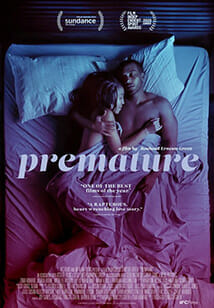 Release: February 21, 2020 (limited)
Release: February 21, 2020 (limited)
Director: Rashaad Ernesto Green
Starring: Zora Howard, Joshua Boone, Michelle Wilson, Alexis Marie Wint, Imani Lewis, Tashiana Washington
Genre: Drama, Romance
Rating: NR
Runtime: 91 minutes
There’s young love, and then there’s love that blooms too young. Rashaad Ernesto Green’s sophomore feature focuses on the latter, one that shapes futures and strains hearts. Premature is about love happening to two people before either is ready, about the euphoric high of their first kiss descending over the course of 90 minutes into the nearly cataclysmic low of decisions made on impulse and under duress. It’s a gorgeous, shattering film, unapologetically real about a number of very real subjects, plot-agnostic but driven by character, consequence and compassion. Green co-wrote Premature with his lead, Zora Howard. Her performance isn’t effortless, it’s effort-conscious: playing Ayanna, a 17-year-old woman balancing her college aspirations and an unexpected summer romance with 20-something NYC transplant Isaiah (Joshua Boone), demands soul-searching. Howard agonizes quietly and internally with the opportunities left for Ayanna to take or leave. But as much as Howard and Boone project maturity, and Green’s filmmaking constructs an illusion of experience around them, they’re still functionally kids. Ayanna recites her poetry in voiceover at intervals throughout the film, each monologue demonstrating her gradual, painful growth. In turn, Green and cinematographer Laura Valladao emphasize an aesthetic that tends toward the palliative. Premature’s naturalism has the effect of sanding its edges; the film doesn’t keep reality’s creeping dread out of the picture entirely, but instead pushes it to the margins, where a shifting landscape in Harlem and Black American anxieties hover patiently. High stakes to put on first love, but first love doesn’t happen in a vacuum. —Andy Crump
Where to Watch: Available on Hulu
Sorry We Missed You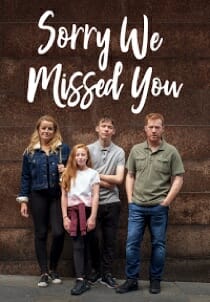 Release Date: March 6, 2020 (NY/LA); April 3, 2020 (expansion)
Release Date: March 6, 2020 (NY/LA); April 3, 2020 (expansion)
Director: Ken Loach
Starring: Kris Hitchen, Debbie Honeywood, Rhys Stone, Katie Proctor, Ross Brewster, Charlie Richmond, Sheila Dunkerley
Genre: Drama
Rating: NR
Runtime: 102 minutes
Ken Loach’s movies typically force viewers to acknowledge the toll a job can take on both body and spirit. Without fuss or forced moralizing, Sorry We Missed You performs this service for the folks who thanklessly zip about town dropping off parcels ordered yesterday by people who actually needed them a week before. The movie demystifies the browser sorcery of one-click purchases by humanizing, for better and for worse, the mechanics behind this modern-day ministration: Loach starts with Ricky (Kris Hitchen), head of the Turner family, who is first met interviewing Maloney (Ross Brewster), his boss-to-be, for a post as an owner-driver for a third-party delivery outfit nestled in North England. Maloney seems reasonable enough. He hears Ricky’s story, at least, his history as a blue-collar man whose years of hard labor have left him craving for freedom from micromanaging bosses. Ricky wants to be his own boss now, and Maloney’s spiel about choice and self-agency appeals to his wants. It’s all an illusion, of course, and the economy of Laverty’s writing succinctly lays out the tension between Ricky’s ambitions and the crushing realities of the position he’s sought out. The gift of personal determination Maloney offers him is a Trojan horse containing seeds of poverty. The way this job works, every package Ricky hands off is another row sown in his inevitable destitution. It’s sick. It’s barbaric. It’s just one problem among several the Turners deal with as a direct consequence of Ricky’s enterprise. He has to sell off, for instance, the family car, which his wife, Abbie (Debbie Honeywood), uses for her own career as a home care nurse, which means she has to use public transportation, which is another stress added to an already stressful job made more stressful by her boss, who like Maloney doesn’t really give a damn about Abbie as a person—only as a hireling. Sorry We Missed You operates on a micro-level with contrastingly astronomical stakes. It’s a movie about one small family—including, apart from Kris and Debbie, their mulish teen son, Seb (Rhys Stone), and younger, sweethearted daughter, Liza Jane (Katie Proctor)—doomed to the streets if either Dad or Mom missteps. They have no safety net. They have no contingency plan. Worst of all, Kris and Debbie both have jobs designed to wring the most out of them with the least compensation or compassion in exchange. The perils of parenthood are enough without having to answer the question of how the lights stay on every day. —Andy Crump
Where to Watch: Available to rent or buy on most major streaming platforms
Time Release Date: January 25, 2020 (Sundance)
Release Date: January 25, 2020 (Sundance)
Director: Garrett Bradley
Genre: Documentary
Rating: NR
Runtime: 81 minutes
Hope and despair constitute the vacillating emotions of Garrett Bradley’s Time, a lyrical look at Sibil “Fox” Rich’s efforts to free her husband from a Louisiana prison, where he is serving 60 years for a botched bank robbery, as his sons grow up without a father in the home (Fox herself served a few years for aiding in the crime). Her dogged attempts to break through to an uncaring bureaucracy are crushing in and of themselves, but the mannered composure with which she takes denial after denial builds a remarkable portrait of strength and resolution. One could ask how much Time grapples with the legitimate wrongdoing of the Rich parents, but Bradley does not give much credence to the question, because to do so would legitimize the system that, in doling out sentences so severe, ignores the humanity of the perpetrators in the first place. Sibil’s understanding of the morality of her and her husband’s situation is obvious, but also somewhat outside of the purview of Time, which is, for the better, much more concerned with the personal dynamic of the central relationship: how one sustains love and life when divided by an uncompromising and punishing system. The answer, in the case of the Riches, is Sibil’s home-made video diaries from a miniDV camera over the years, patched together with a score that gives the entire film the feel of a swelling epic—the intensely personal elevated to mythical proportions. Time truly builds to an ultimate moment of catharsis, which through its black and white imagery and heightened score fill an already deeply human moment with the additional powers of cinematic grace. —Daniel Christian
Where to Watch: Not yet available, but Amazon bought distribution rights out of Sundance, so we should expect a release this year
Vitalina Varela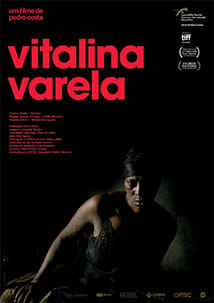 Release Date: February 20, 2020
Release Date: February 20, 2020
Director: Pedro Costa
Starring: Vitalina Varela, Ventura, Manuel Tavares Almeida
Genre: Drama
Rating: NR
Runtime: 124 minutes
If black defines the visual tone in Vitalina Varela, stillness provides the picture’s structure. Portuguese master Pedro Costa shot Vitalina Varela using an aspect ratio close to the Academy ratio (1.33:1 instead of 1.37:1); the result is a movie almost squarely framed, and from that comes the feeling of being hemmed in. There’s very little room to breathe, much less move around; the images do move, but so slowly and so haltingly that they practically read as still anyways.
Life in Lisbon’s utterly devastated Fontaínhas shantytown is a parade of smothered humanity. Residents march, shamble and occasionally lie prone on the ground, faith depleted, energy drained. Why anyone would return here after spending decades away is a question Costa answers within its first 10 minutes, when the title character, named for the actress who plays her, touches down on the tarmac and is immediately met with bad news. “Vitalina, you arrived too late,” one of the airport workers serving as the welcome wagon tells her. “Your husband was buried days ago. There is nothing in Portugal for you.” Vitalina’s angry. She’s heartbroken. For 40 years, she lived alone in Cape Verde, her husband, Joaquim, having abandoned her. Now, at long last able to reunite with him, she finds that she’s inherited the mess—worldly and spiritual—he left with his passing: the house he built for them, but also the demons he collected over the course of their separation. Each person who comes to Vitalina’s door has demons of their own, too, and no one the audience meets is free from grief, the emotion for which the movie’s pervading darkness functions as an avatar: There’s nothing here for Vitalina other than the task of reconciliation. Withstanding the procession of Vitalina Varela’s suffering requires patience and endurance, but maybe the way Costa and Varela explore grief’s every nook and cranny will yield unexpected relief from our own. —Andy Crump
Where to Watch: Available through Grasshopper Film’s Virtual Screening Room, sharing proceeds with local, independent theaters across the country
The Whistlers Release Date: April 3, 2020 (US)
Release Date: April 3, 2020 (US)
Director: Corneliu Porumboiu
Stars: Vlad Ivanov, Catrinel Marlon, Sabin Tambrea, Rodica Lazar, Agusti Villaronga
Genre: Drama, Thriller, Comedy
Rating: R
Runtime: 97 minutes
Director Corneliu Porumboiu is no stranger to procedures or regulations, nor insensitive to the ways in which the strictures we impose on ourselves and others end up wrapping us up from within. His previous film, the documentary Infinite Football, allows his friend Laurentiu Ginghina time and cinematic space to explain the many modifications and new rules to enact in order to, he believes, completely revitalize the sport of football—all while exorcising the trauma of post-Communist Romania. The crime drama, then, is a genre particularly suited to Porumboiu’s concerns, and his latest, The Whistlers, appears as much a pulp exercise as a stylish deconstruction of social order in all its forms, from the institutions of justice to the basic tenets of language. In it, laconic, mild-mannered cop Cristi (Vlad Ivanov) navigates an elaborate schema of criminal enterprise and double-crossing police to walk away with a life-changing amount of stolen drug money. The key to much of the film’s convolution can be found on La Gomera, in the Canary Islands, where Cristi learns a native whistling language called El Silbo in order to clandestinely communicate with archetypal folks like Gilda (Catrinel Marlon), the girlfriend of Zsolt (Sabin Tambrea) who owns a mattress warehouse through which he’ll abscond with money stolen from mob boss Paco (Augusti Villaronga), all while avoiding Police Chief Magda (Rodica Lazar), Cristi’s boss and another remnant of Communist Romania left to her own self-serving motivations. Though Porumboiu recalibrates a typical neo-noir plot by playing with chronologies and perspectives, adding a dose of pitch-black humor to leaven the film’s ostensible bleakness—and cinematographer Tudor Mircea’s shots of the Spanish coast are something to behold—rather than amounting to placeholders lost in a twisty plot twisted for the sake of it, Porumboiu’s many players survive the chaos. They are defined by it. We understand who these people are through the ways in which they struggle to escape the system. And by the time we’ve untangled the film’s plot, we’re offered a final moment of catharsis, a sense—after 90 minutes of state-sanctioned violence and depravity—of what freedom feels like. —Dom Sinacola
Where to Watch: Available to rent or buy on most major platforms
The Wild Goose Lake Release Date: March 6, 2020
Release Date: March 6, 2020
Director: Diao Yinan
Starring: Hu Ge, Kwai Lun-Mei, Liao Fan, Regina Wan, Huang Jue, Dao Qi
Genre: Drama, Thriller
Rating: NR
Runtime: 117 minutes
We know where this is going: A neo-noir shot through with romantic fatalism and impressionist hints of ultra-violence—think Nicolas Winding Refn’s Gosling duology without the primordial fear of sex—Chinese director Diao Yinan’s fourth feature may feel only surface-deep, but oh the inevitability that thrives beneath its rain-soaked neon and pouty protagonist. Noir tropes abound (wreaths of cigarette smoke pumping from the lungs of hopelessly beautiful riff-raff; rain; double- and triple-crosses; helplessly saturated colors obscuring post-industrial collapse) as the fate of gangster Zhao Zhenong (Hu Ge), linked inextricably to sex worker Liu Aiai (Gwei Lun-mei), avoids both a happy conclusion and, somehow, Chinese censors. We know where this is going, but we’re seduced regardless by the director and cinematographer Dong Jinsong’s oneiric mise-en-scene. A brawl among bikers in a dingy cellar plays out like a forgotten memory, images hewed down to their bones and lit with second sense; a chase through a zoo feels like a prelapsarian hallucination, animals appearing to stare blinklessly on the follies of man. Another man loses his head quite brutally, a punchline too grisly to find funny. In The Wild Goose Lake’s starkest moments, silliness shakes hands with tragedy, betraying the desperation at its heart. We know where this is going; we’re unable to turn back. —Dom Sinacola
Where to Watch: Available through Film Movement’s Virtual Screening Room, sharing proceeds with local, independent theaters across the country; also available to buy or rent on most major streaming platforms
The Wolf House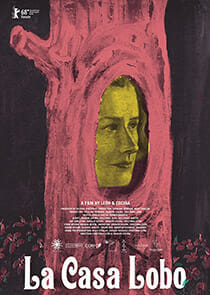 Release Date: May 1, 2020
Release Date: May 1, 2020
Directors: Joaquín Cociña, Cristóbal León
Starring: Amalia Kassai, Rainer Krause
Genre: Horror, Animation, Drama
Rating: NR
Runtime: 75 minutes
Joaquín Cociña and Cristóbal León’s Spanish-German language film The Wolf House is equal parts surreal, tragic and disturbing, due to both its uncanny stop-motion animation style and the real-world inspiration from which it draws. The film follows the perilous journey of María (Amalia Kassai), a young German woman who has narrowly escaped the jaws of a Nazi cult but must now outrun a hungry wolf hot on her trail. The cult María flees is based in Southern Chile, making it an evident parallel to Colonia Dignidad, a German sect established in Chile in the early ’60s by a man named Paul Schaefer, who was about to go on trial for child molestation in West Germany before he was granted sanction to enter Chile. As the wolf draws nearer, María stumbles upon a small house in the middle of the woods. She quickly makes herself at home. The house is ostensibly abandoned, save for two small pigs living in squalor in one of the bathrooms. María vows to raise the pigs as her own children, naming them Pedro and Ana. She clothes them, feeds them the little unspoiled food remaining in the house and excitedly tells them that she will teach them “everything that she knows.” But María finds it difficult to navigate what the cult has imparted on her, and complicated feelings surrounding pleasure, punishment and eugenic aesthetic ideals begin to find themselves seeping into her lectures to Pedro and Ana.
Accordingly, The Wolf House can feel sickening at points, mostly due to the ever-morphing vessels that serve as avatars for María, Pedro and Ana. Their corporeal forms emerge crudely shaped from clay, ooze onto the walls and windows as painted figures, grow bloated and disjointed as paper-mache, stitched together and dressed with felt and plush. The titular lycanthropic abode was a real house that the filmmakers utilized to create the film’s uncanny, human-scale dioramas, the diligent craftwork of the years-long undertaking captured in the finished product’s every frame. By confronting the state-sanctioned violence in Chile’s recent past, Cociña and León construct a physical space to reflect the emotional space one must inhabit to process these traumas and to confront the evil figures that may still live within them. —Natalia Keogan
Where to Watch: Available through KimStim virtual cinema, sharing proceeds with local, independent theaters across the country
Zombi Child Release Date: January 24, 2020
Release Date: January 24, 2020
Director: Bertrand Bonello
Starring: Louise Lebeque, Katiana Milfort, Mackenson Bijou, Wislanda Louimat
Genre: Drama, Horror, Thriller
Rating: R
Runtime: 103 minutes
What does and doesn’t constitute cultural appropriation? Tracking down your classmate’s mambo aunt and begging her, in between offering her wads of money, to cast a voodoo spell on your pretty boy ex? French filmmaker Bertrand Bonello’s latest picture, Zombi Child, is half historical account, half racial reckoning—entirely ambitious, and equally as ambiguous. Bonello is white, just like Fanny (Louise Labeque), his bratty, lovesick protagonist, a student at the Légion d’honneur boarding school, which Napoleon established for the purposes of educating the daughters of men awarded the, well, the Légion d’honneur, and where entry remains a hereditary right. To her, voodoo is a means to an end, that end being that Pablo (Sayyid El Alami), her beau, has his soul bound to hers. To Katy (Katiana Milfort), a Haitian voodoo priestess, and to Mélissa (Wislanda Louimat), Katy’s niece and Fanny’s literary sorority sister, it’s a spiritual discipline, an aesthetic and a way of life, rich with beauty but carefully marked by caution signs to keep practitioners from making decisions they’ll regret. Zombi Child treats voodoo as a character in its own right, a living organism to be revered and not screwed around with. Naturally, Fanny’s first instinct upon hearing of Mélissa’s ancestry and her connection to voodoo is to try and screw around with it, as if voodoo is a class of magic in D&D rather than a set of syncretic religions practiced in the Dominican Republic, Haiti, Louisiana and Brazil. Mélissa tries educating Fanny and her friends on what voodoo means to her as the granddaughter of Clairvius Narcisse, on whose life Zombi Child is based: In 1962, Narcisse (played here by Mackenson Bijou), died, was buried, then returned to life as a zombie, meaning he was actually mickeyed with a melange that made him seem dead, buried alive, then dug up by plantation owners who forced him to harvest sugar cane as their stupefied thrall. Zombi Child isn’t a horror movie. It does, however, take notes from horror grammar, and the audacity of Bonello’s filmmaking is enough to inspire madness. But the heart that drives Zombi Child forward beats in the pursuit of cultural justice. The film wrestles with identity, and with whiteness especially, and with France’s reputation as an icon of revolution alongside its unflattering reputation as a colonial power guilty of inhuman atrocities. The conclusions Bonello draws are inevitably vague, but the most important message is obvious: That’s cultural appropriation. —Andy Crump
Where to Watch: Available through Film Movement’s Virtual Screening Room, sharing proceeds with local, independent theaters across the country; also available to buy or rent on most major streaming platforms







































